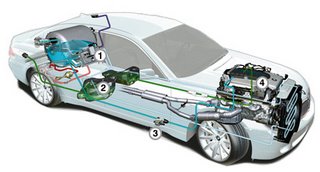
Heading north out of Berlin, towards miles and miles of German autobahn, the roaring six-litre engine belies the top-of-the-range BMW's true potential: to save the world.
Powered by liquid hydrogen that is stored in a vacuum-sealed tank, the engine delivers a whopping 300bhp, yet the emission escaping through the exhaust pipe is mainly pure water vapour.
Unlike rival hydrogen models in the making, which use fuel cells, the BMW Hydrogen 7 is kitted out with a conventional combustion engine that can also run on petrol.
This makes it possible to use it as an everyday car, which is why BMW has announced plans to put hydrogen powered cars into production, months or years ahead of its competitors.
Having stolen a march on its rivals, BMW is far from shy about milking it for all it is worth.

Wealthy endorsement
BMW has already received plenty of offers from politicians and executives, scientists and athletes, rock stars and TV personalities, all eager to help "create visibility for hydrogen".
Madonna, David Suzuki, Al Gore and Arnold Schwarzenegger are said to be among a long line of celebrities queuing up to endorse the car, and perhaps further enhance their own green images in the process.
But they will have to pay for the privilege.

The risk of explosion if the car is parked inside a garage and the lack of luggage space caused by the massive hydrogen tank taking up half the boot.
With no more than five hydrogen fuelling stations in the world supporting BMW's technology, early adopters will have to rely on mobile fuelling vehicles that are set to arrive, complete with support crews.
Or they can press a little button on the steering wheel that switches to petrol and extends the car's range by a further 500 gas-guzzling km.
BMW says it wants to lead the way to encourage governments and investors to provide a regulatory framework and an infrastructure that can make a hydrogen economy a reality.
Even more important than getting the fuelling stations up and running is the need to find ways to create enough cheap and clean hydrogen.
"Hydrogen is an energy carrier," points out Wolfgang Leder of Total Deutschland's new energy team.
"There are several ways to produce it. Wind power would be the best, or solar."
The problem is that currently most hydrogen is generated from fossil fuels, since the cost of generating it from, say, solar energy can be up to four times higher.
And when hydrogen is produced this way, well-to-tank and tank-to-wheel analysis shows the overall carbon dioxide emissions from hydrogen powered cars can be higher than that from petrol or diesel powered vehicles.
What is required is large scale investment in technology, BMW insists, and the carmaker - along with many of its rivals - is prepared to do its bit.
"One day, even petrol and diesel will have to compete with hydrogen," predicts BMW's marketing and brand manager, Torsten Muller-Otvos.
The company declines to divulge exactly how much money it has sunk into the project, though it says 300 of its 7,500 engineers work on it full time.















